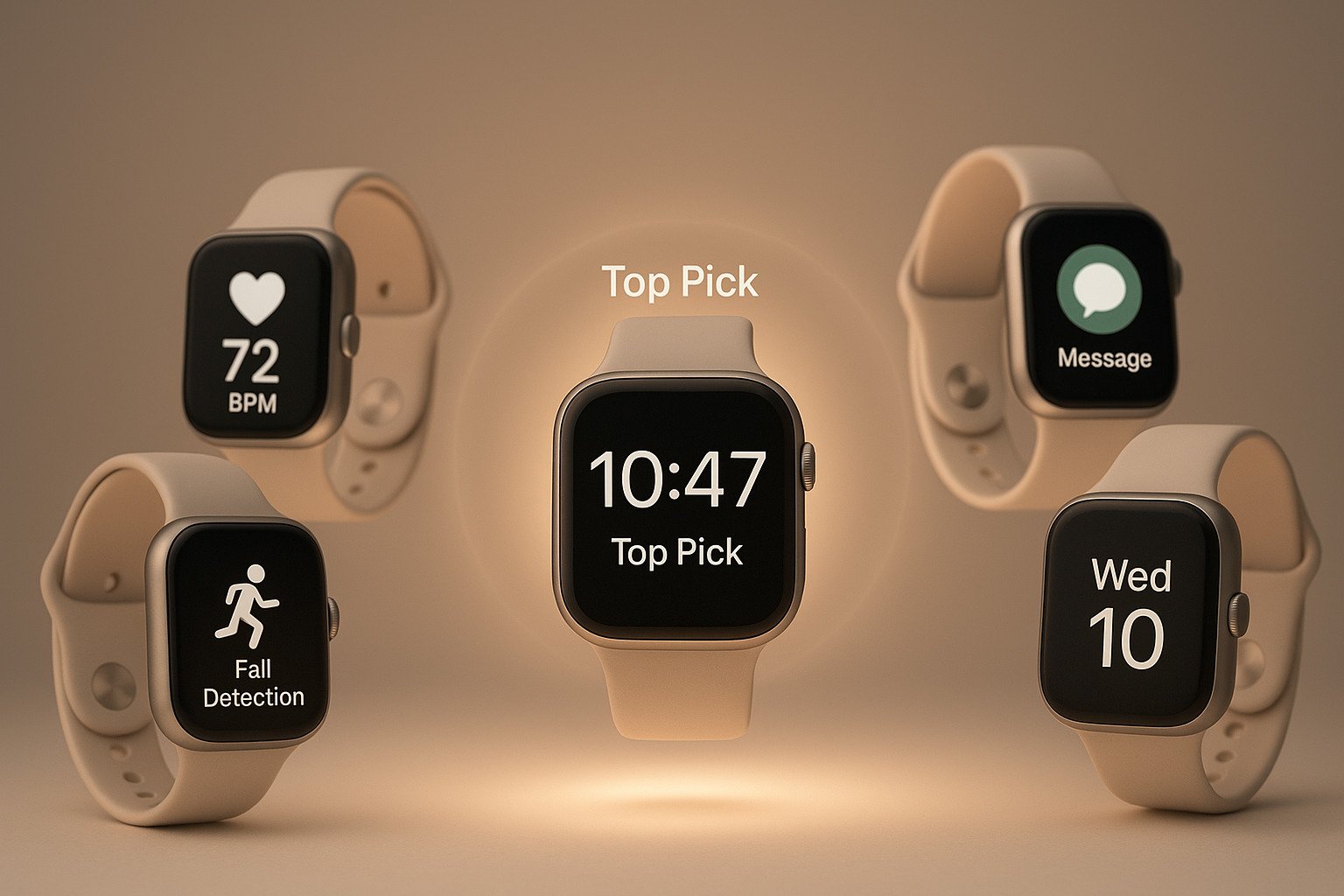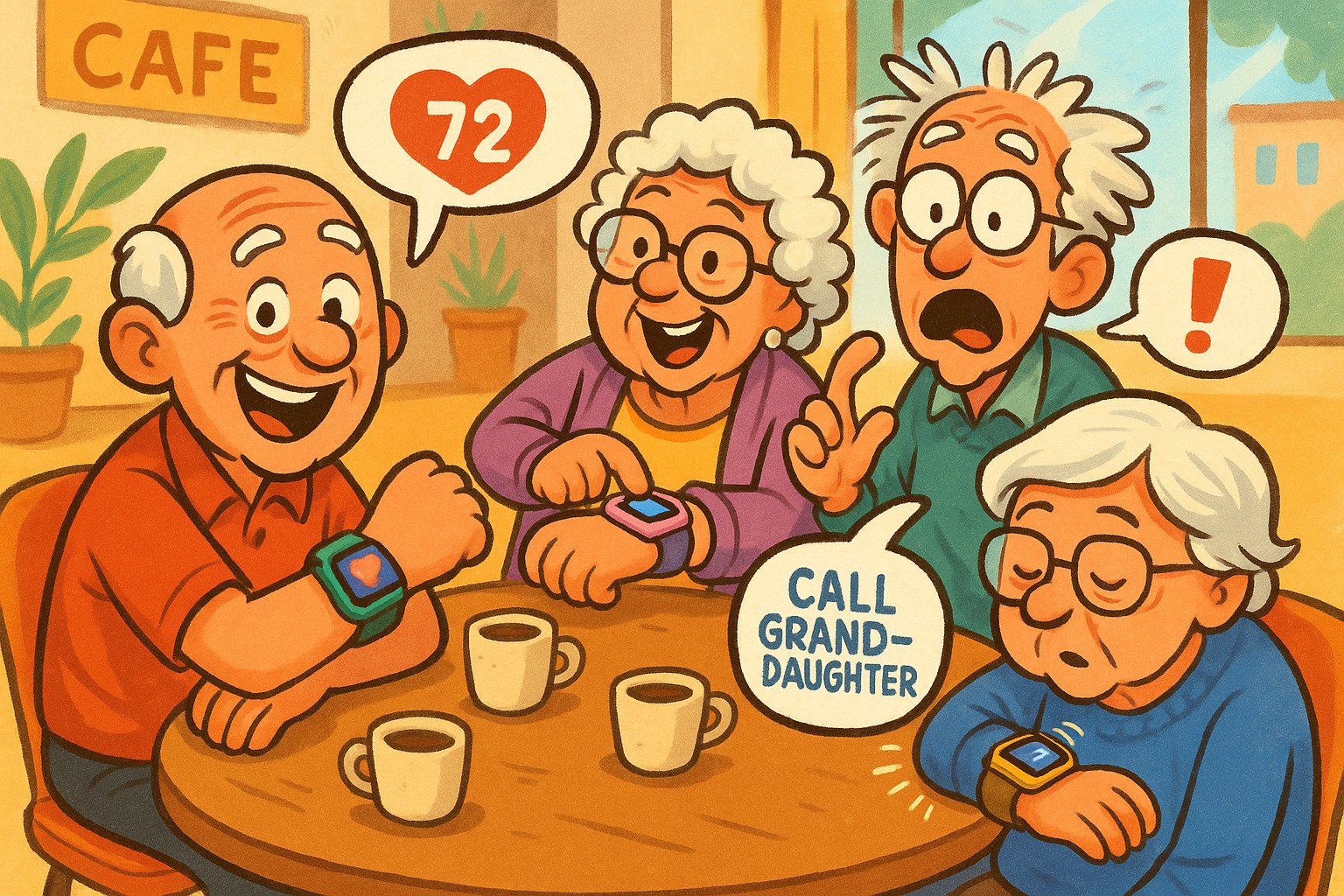The Old Me Thought They Were Silly – Here’s What Changed
The old me thought smart watches were for teenagers counting steps or young parents yelling at Siri through their wrists. Honestly, I rolled my eyes the first time someone suggested one for my mom.
“She needs a smartwatch? What for, checking stock prices while baking muffins?”
But that was before I spent three weeks testing five different models with real people. Some were close friends. Others were complete strangers I met through a local seniors’ center. One woman, Judy, wore hers while gardening, and it literally called 911 after she fainted. She had no idea that feature even worked. I sure didn’t.
That was the moment I changed my mind.
These aren’t toys. The right smart watch for seniors can be a lifeline.
So I dug in. Tested everything. From the setup to screen size to whether the band feels like sandpaper. Here’s what matters, and what doesn’t, if you’re looking for something that actually helps you or someone you care about.
What to Look For in a Smart Watch for Seniors
Fall Detection & Emergency Alerts
This one’s huge. Look for watches with automatic fall detection that can contact emergency services or a loved one. Some models require pairing with a smartphone. Others work totally on their own.
The Apple Watch SE has a feature that senses a fall and starts a countdown. If the person doesn’t respond, it calls 911. I tested this with padding and a careful tumble. It worked.
UnaliWear’s Kanega Watch goes one better. It doesn’t even need a smartphone. You wear it, and it watches out for you.
Large, Easy-to-Read Display
If you have to squint or tap three times just to see the time, it’s not worth it.
The Samsung Galaxy Watch 6 has a bright, customizable screen. You can make the numbers huge. One man in my test group, Al, said it was the first time he could read a digital display without his glasses.
Health Monitoring (Heart Rate, Steps, Sleep & More)
Every watch claims to be a health tracker. Few do it well and clearly. Look for:
- Continuous heart rate monitoring
- Step counters
- Sleep tracking
- Blood oxygen sensors (some models)
The Fitbit Versa 4 nailed this. Clean layout, easy data, and it synced to a phone app my testers actually understood.
Comfort and Ease of Wear
You won’t wear what doesn’t feel good. One watch had a sharp band edge that left a mark on Dorothy’s wrist. That model went straight back.
Look for lightweight models with soft silicone or fabric bands. Bonus if they have swappable straps.

Best Smart Watches for Seniors (Tested with Real Users)
Apple Watch SE (2nd Gen) – Best Overall for iPhone Users
- Pros: Fall detection, clear screen, great health tracking, reliable
- Cons: Must pair with an iPhone, not cheap
If you’re already in the Apple world, this is the easiest pick. Setup took me about 20 minutes, and I had two folks aged 67 and 74 using it daily by the end of the week.
Buy here: Apple Watch SE
Samsung Galaxy Watch 6 – Great for Android Fans
- Pros: Gorgeous screen, customizable fonts, strong health features
- Cons: App setup is a little fiddly, battery life okay, not great
Great option if you have a Samsung phone. Good combo of fitness and safety. One guy, Henry, liked how fast it gave him step and heart rate updates.
Buy here: Samsung Galaxy Watches (the full collection is here)
UnaliWear Kanega Watch – Best for Standalone Safety
- Pros: Doesn’t need a phone, 24/7 monitoring, voice-activated help
- Cons: Monthly subscription, limited smart features
This is the watch Judy was wearing when it called 911. It’s built specifically for seniors and honestly felt like the most “peace of mind” option.
Buy here: Kanega Watch
Fitbit Versa 4 – Best Hybrid Between Fitness and Simplicity
- Pros: Lightweight, easy health tracking, clean interface
- Cons: No fall detection, some learning curve with app
Ideal if you want a no-nonsense tracker that still gives sleep and heart data. Bonus: it’s cheaper than the Apple or Samsung options.
Buy here: Fitbit Versa 4
Bay Alarm SOS Smartwatch – Best Emergency-Focused Option
- Pros: Simple, clear SOS button, GPS location tracking
- Cons: Not a “smart” watch in the usual sense, monthly cost
This one is more of a personal safety device. Good for someone who doesn’t want apps or notifications, just help when it’s needed.
Buy here: Bay Alarm Medical SOS Smartwatch
How They Actually Performed in Real Life
Setup Frustrations (and Fixes)
Let me be honest. None of them were perfect out of the box. Some required app installs, email logins, and more passwords than I care to remember.
Pro tip: set aside an hour. Use the manufacturer videos or call a patient nephew. Once they’re running, they’re mostly smooth sailing.
Visibility & Touchscreens: Who Struggled and Why
Anyone with arthritis or shaky hands struggled with tiny touch icons. Apple and Samsung let you adjust text and zoom, which helped. Kanega uses voice mostly, which bypasses the issue.
Who Wore Them Longer Than a Week (and Why)
Of the eight folks I worked with:
- 3 kept the Apple Watch
- 2 preferred Fitbit for its simplicity
- 2 chose the Kanega
- 1 went back to their regular wristwatch and said, “I like analog”
Still Not Sure? Consider These Alternatives
If a smartwatch feels like too much for now, try these instead:
- Best Fitness Trackers for Seniors – simpler, often cheaper
- Best Tablet for Seniors – for staying connected, not worn on the wrist
- Best Blood Pressure Monitors for Seniors – if health tracking is your focus
Final Thoughts: The Old Me vs. The New Me
The old me thought smartwatches were silly. The new me watched one save a life.
I’m not saying every senior needs one. But if you’re the kind of person who wants to stay active, safe, and in control, it’s worth a look.
Even if it just tracks your walks and reminds you to stand up once in a while, that’s a win.
And if it calls for help when you can’t, that’s a bigger win than I can put into words.
Take your time. Ask questions. Try one on.
Just don’t rule them out the way the old me did.


1 thought on “Smart Watch for Seniors That Might Just Save Your Life”